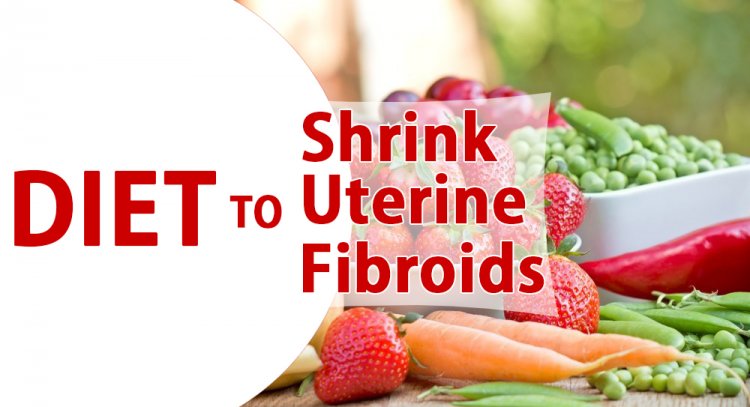Shrinking Fibroid with Diet

Shrinking Fibroids with Diet :
Fibroid are harmless growths in the uterus . They are also called uterine Fibroids. Fibroid are not Cancerous or life-threatening but they can sometimes cause complications and health problems. Fibroids are form in and around the uterine walls . They are made of muscle and other tissues . They may be as tiny as a seed or grow larger than a tennis ball . One may have multiple fibroid or just one . Doctors don’t know exactly what cause Fibroids. Being overweight or obese may increase your risk of Fibroid grow faster .
Prevalence
Almost 80 Percent Of Woman’s Have Fibroids In Their Lifeline It Gets Developed Either Before Marriage Or This Also Maybe Genetic .
Fibroid Can Cause Symptoms And Complications Such As :
Pain In Lowe Abdomen
Heavy Menstrual Bleeding
Constipation
Anaemia
Miscarriages
However only 20 to 50 percent women with fibroid have symptoms . In most cases treatment is not needed . Your doctors may ask you to wait and watch to see if Fibroid gets shrink on their own or go away. Foods cant treat or prevent Fibroid but your daily diet may play a role in reducing the risk of growing more . Certain foods may also help to ease fibroid symptoms. Diet and Lifestyle change to Lower the Risk
There Are Number Of Change That You Can Make To Reduce The Risk Of Fibroid.
Things To Do :
Do's
Fresh Fruits & Vegetables: Load up on fresh fruits and vegetables. A recent study found that eating plenty of fruits like apples and tomatoes, and cruciferous vegetables like broccoli and cabbage, could lower the risk of developing fibroids. And, eating healthier choices like organic fruits and vegetables and whole-grain foods could help improve your symptoms.
Green Leafy Vegetables: Green leafy vegetables have many anti-inflammatory effects, so they may discourage the growth of fibroids in a woman’s body. These vegetables are also vitamin K-rich foods, which aid in blood clotting and help control menstrual bleeding. Add plenty of fresh and cooked green vegetable.
Cruciferous Vegetables : Cruciferous vegetables support detoxification of your liver and may help balance estrogenic levels. Broccoli, cabbage, Chinese cabbage, tomato and apple seems to be a protective factor for uterine fibroids, potentially due to their high antioxidant and fiber content. Research has shown that a plant-based diet, including greater intake of cruciferous vegetables (and fresh fruits), is capable of reducing the incidence of uterine fibroids in women.
Beta Carotene: Rich Foods. Upon digestion, the human body turns beta carotene into vitamin A, which promotes the growth and repair of healthy tissues, which can be very helpful for treating fibroids. Some foods that are high in beta-carotene include carrots, sweet potatoes, kale and spinach.
High-Iron Foods : Fibroids sometimes cause some women to lose more blood during their monthly menstruation. This can lead to anaemia. To replace the excessive loss of iron due to increased bleeding, include high-iron foods like grass-fed beef and legumes in your diet.
High In Fiber : Rich foods aid weight loss and balance hormones. They also help to keep blood sugar levels steady. For these reasons, fiber may help prevent and slow the growth of fibroids. Add these whole foods to your diet.
Add Dairy Products: Add dairy products such as yogurt and full-fat cheese to your diet. Dairy is rich in calcium, phosphorus, and magnesium. These minerals may help prevent fibroids and slow their growth. Fortified milk also contains vitamin D.
Go with Green Tea : Green tea contains several antioxidants. A study found that one of these, epigallocatechin gallate, may help slow the growth of fibroids by bringing down inflammation and high estrogen levels. Green tea may also improve symptoms of heavy bleeding due to fibroids, such as low iron.
Flaxseeds : Flaxseeds can help balance estrogen levels in the body, which can in turn work to shrink fibroids. You should aim for at least 2 tablespoons per day if you already have fibroids. You can sprinkle flaxseeds on oatmeal, in your smoothies or simply eat the seeds by themselves.
Whole Grains. Instead of eating refined grains, opt for healthier whole grains like millet, spelt, brown rice, buckwheat, rye and oats. These are higher in fiber, contain more minerals and tend to be much less processed.
Keep an eye on your blood pressure : Doctors has said that there is a strong link between fibroids and high blood pressure. Talk to your doctor about how to manage your blood pressure, either with diet, lifestyle, or medication. Potassium .Potassium helps to counter the effects of salt to balance blood pressure. Add these potassium-rich foods to your daily diet.
Manage your stress level : The impact of stress on fibroids, some studies suggest the two may be linked. Try relaxation techniques like yoga, massage, and tai chi to help manage your stress. Some women find that alternative therapies like acupuncture can help relieve their period pain, too.
Note : Make yourself comfortable. If you’re having painful periods because of your fibroids, try lying down and elevating your legs with a pillow. Or lie on your side and bring your knees into your chest to take the pressure off your back.
Vitamin D : Get enough vitamin D it may help reduce your risk of fibroids by almost 32 percent. Your body makes this “sunshine vitamin” naturally when your skin’s exposed to sunlight. If you have darker skin or live in cooler climates you’re more likely to be deficient. Talk to your doctor before trying any supplements like vitamin D could be helpful in lowering your risk for fibroids.
Organic Foods : Eating mostly organic foods may help to prevent and shrink fibroids because organic products are grown and made without the use of chemical pesticides.
Things To Avoid :
Don’ts
Don’t skip your workouts : One study found that women who exercised the most (about 7 hours per week of activities like running, dancing, or walking) had the lowest chance of developing fibroids. Exercise can also help keep your blood pressure down.
Don’t overdo it on the Sugar Intake : Eating a high-sugar diet could be linked to a higher risk of fibroids. Consuming a lot of refined sugar can promote inflammation and lead to weight gain. It may also increase pain and reduce immune function. There’s an association between weight gain and hormonal imbalance, and these two factors can encourage the development of fibroids.
Don’t Consume Smoke : Experts believe that smoking can increase your period pain because it reduces the amount of oxygen that gets to your pelvic region.
Don’t Consume Alcohol : Over-consuming alcohol can definitely contribute to increased inflammation throughout the body. It also reduces immune function; can promote weight gain; and encourages hormonal imbalances. By reducing or eliminating alcohol, you can help to get your hormones back on track and hopefully help shrink existing fibroids.
Don’t Consume Caffeine: Too much caffeine is taxing on your body, especially your liver. When you give your liver more work to do than it can handle, it isn’t going to do as good of a job at keeping your hormones in check. The more you can keep your alcohol and caffeine consumption down, the easier it is for your liver to detoxify your body and keep your hormones in proper, fibroid-discouraging balance.
Don’t Consume High-Fat Processed Meats : High-fat, processed meats are some of the worst food choices for women when it comes to fibroids. Foods high in unhealthy fats, like non-organic/processed meats or trans-fats (think hamburgers and processed breakfast sausages), can increase inflammation levels. Processed foods also often contain chemical additives and other ingredients that promote inflammation. Limit the amount of meat you eat by also including plant-based protein in your diet. When you do eat beef, always try to opt for grass-fed beef.















































